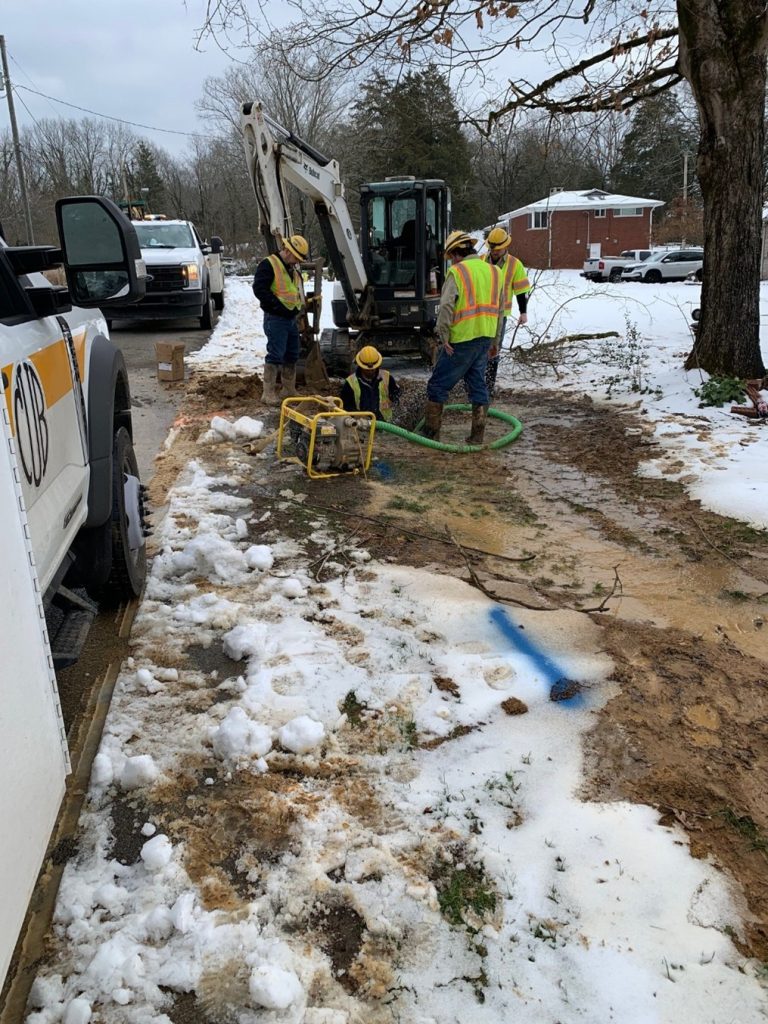Customer Service: (865) 457-9232
cservice@clintonub.com
Winter’s Effect on Water Lines
Water main breaks can occur at any time of year but are more likely to occur in the winter. Therefore, it’s not uncommon to see a rash of water main breaks in bitterly cold weather. As the water temperature dips below 39 degrees, the water inside the underground pipe expands and causes an increase in pressure within the pipe. When the pressure gets too high, the pipe can rupture. Until the water temperature leaving our plant gets closer to 39 degrees, we expect to continue to see a spike in the number of breaks.
While the temperature on the thermometer drops outside, the temperature of the water flowing through the pipes is typically warmer. It’s when the water temperature begins falling that things have a greater chance of springing a leak. Water’s maximum density is 39 degrees, and once it reaches that temperature, the water molecules start to expand. That creates pressure on the pipes- up to hundreds of pounds of pressure!
Another factor in how many main breaks CUB Water experiences during winter is ground temperature. Think of the ground that surrounds the water main as a “blanket” that provides insulation. A cycle of freezing and thawing leads to friction in the earth and can cause the pipes to shift. The material of the pipe also makes a difference. CUB’s Water’s distribution water mains (those smaller than 16 inches in diameter) are a combination of either ductile iron or cast iron. We’ve found that cast iron pipes can break more easily. The temperature drops and swings intensify existing “weak spots” which can lead to breaks.
Our Customer Service Center is not receiving the high volume of calls from customers with frozen pipes inside their homes. Still, when we receive a customer’s report of no water, we investigate by visiting the home or business to inspect our mains and meters. For a majority, the water lines or pipes that freeze are on the customer’s property.
Unfortunately, the nature of a water main break almost always affects some customers because, typically, you have to valve off the waterline to make the repair. During those instances, we ask that those affected remain patient as repairs are performed effectively and thoroughly. The CUB Water Crews are working as quickly as they can to repair the water main both safely and correctly.
Report Water Issues by Phone
(865) 457-9232

Tips for Winter
During cold weather, we continue to remind customers of tips to minimize the risk and damage from frozen water pipes, according to Consumer Reports:
- Keep garage doors closed, especially if there are water supply lines in the garage.
- Open kitchen and bathroom cabinet doors to allow warmer air to circulate around the plumbing, especially if your sinks are on an exterior wall. (If you have small children, be sure to remove any harmful cleaners and household chemicals.)
- Let the cold-water drip from a faucet served by exposed pipes. Running water through the pipe—even at a trickle—helps prevent pipes from freezing.
- If you plan to be away during cold weather, leave the heat on in your home, set to a temperature no lower than 55° F.
- For the long term, add insulation to attics, basements, and crawl spaces. Insulation will maintain higher temperatures in those areas. To prevent drafts, seal cracks and openings around windows, doors, and sill plates where the house rests on its foundation. Insulate the water lines in the house if they are in unheated basements or crawl spaces. Also, cover the vents to crawl spaces.
- Locate the water shut-off valve. This is the valve that controls the flow of water into the house. It’s usually located near the hot water heater, in the basement, or in a utility closet. Turning off the water in the event of a burst pipe can minimize the damage. Once you locate the valve, tag it with a waterproof hanger or a ribbon.
Underground Utility Information
- In Tennessee, it is state law that you must call before digging to make sure you know the location of any underground utility lines.
- Utilities are allowed 72 hours to perform the locate service, so plan ahead.
- Call 811 to request underground utilities be located. There is no charge for this service.
